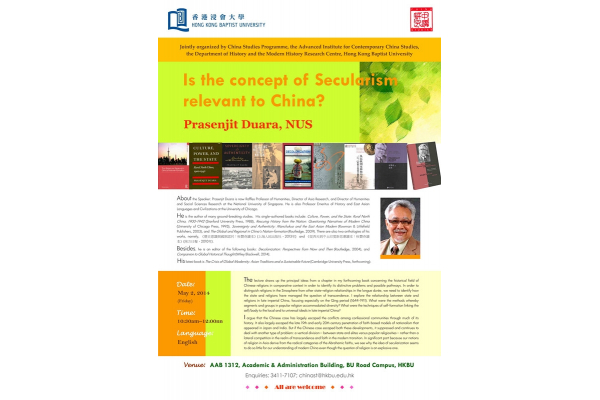04 APR 2014
The China Studies Programme, the Advanced Institute for Contemporary China Studies, the Department of History and the Modern History Research Centre of HKBU invited Professor Prasenjit Duara, who is Raffles Professor of Humanities, Director of Asia Research, and Director of Humanities and Social Sciences Research at National University of Singapore, to share his insight on “Is the concept of Secularism relevant to China?” last week. More than 40 faculty members, students, and members of the public participated in the open lecture.
Professor Prasenjit Duara shared the principle ideas from a chapter in his forthcoming book, The Crisis of Global Modernity: Asian Traditions and a Sustainable Future. The talk discussed Chinese religions in comparative context in order to identify its distinctive problems and possible pathways from studies of historical sociology. He explored the state-religion relationship while addressing the question of transcendence from the late imperial era to early Republican China.
While comparing case studies in Europe, Japan and India, Prof. Duara highlighted that the Chinese case largely escaped from the conflicts among confessional communities through much of its history and the penetration of faith-based models of nationalism in the late 19th and early 20th century. In China, the dynasties and emperors made use of religion to strengthen their rules. Unlike the situations in the West, the Chinese emperor monopolized the communication with the notion of an omnipotent God for sovereignty, while the commoners had only access to gods of smaller scale.
Professor Duara stated that the Chinese case needed to deal with the problem of vertical division between state and elites versus popular religiosities. Therefore, he believed this kind of secularism do so little for our understanding of modern China.











